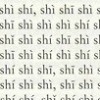May Dy’s “We” [Read the poem here] (First published in Issue #18 of Cha)
-This post is written by Benjamin Huang.

May Dy’s “We” ponders questions of travel and memory, history and desire. One sultry day, the speaker recalls a trip taken with her lover to Angkor Wat, the decayed ruins of which have led her to contemplate the dissolution of their relationship.
The poem opens with a prosopopeia: ‘The season cannot make up its mind, / It lingered in monsoon without parting with the sun. / Rain fell from the glowing sky’ (L1-L3). Already in the poem’s first stanza we are presented with indecision, paralysis, and separation. This meteorological condition reminds the speaker of an ‘impromptu trip’. Yet this casualness is belied by a reminder of mortality: ‘Where you said my fingers were like candlesticks, / They’d melt in the heat’ (L5-L6). Human flesh will itself dissolve in a grotesque anti-birthday celebration.
At the time of the trip the relationship is already over. ‘You weren’t afraid to have your heart broken’ (L7), the speaker says. She then describes her own heart as a timekeeping piece whose very operation rips her flesh: ‘Mine had in its place a clock that turns / In between bones and nerves’ (L8-L9) She had hoped that the passage of time might have brought relief. Instead, watching ‘Mango-skinned youths’ walking ‘on red dust’, she realises that the past never really is past; it is always revisited: ‘Watching them I learned time / Did not promise closure, disappearance is / The afterthought of grief’ (L12-L14).
After this she employs a striking metaphor: ‘And love is a finely carved stone’ (L15). Yet the stone does not signify permanence, but only the illusion of permanence. And the illusion is part of the cruel mechanism that continues to rip her flesh: ‘Sacred make-believe, immovable / Handmade for this clockwork heart’ (L16-L17). We must note that the ruins at Angkor Wat are Mahayana Buddhist, two of whose primary tenets are that permanence is an illusion and that attachment leads to suffering.
The seventh stanza turns to the ruins themselves. Dy alludes to four enormous carved stone faces at a temple at the site, which belong to a ‘venerable king’. Despite their being stone and reaching for ‘The heavens’, they are ‘reflected in a pond’ — hence, the king’s attempt to create a lasting monument to himself is shown to be something ephemeral and illusory. This futile gesture is parallel to the speaker’s own failed attempt to find something solid and permanent in their relationship: ‘I thought I held ours in my empty hand, / It was only you and a passing cloud’ (L20-L21).
She reflects that perhaps whatever a relationship is can only be constructed from the broken debris of what once was: ‘Perhaps this is what being together means, / Creating life around ruins, from stones, / Subsistence by thought alone, / Completion is monumental’ (L22-L25). Unity can only be achieved retrospectively, through memory — although any attempt at memorialisation is itself doomed to dissolve into a reflection or disintegrate into ruin.
The speaker despairs of any possibility of reconciliation or harmony. ‘We walk in as fragments and halves in spite of ourselves / Often I asked whether two sad people / could still be sad when they’re together’ (L26-L28). We then arrive at an epiphany: ‘I like to think I found the answer / In a new land, under strange weather. //We slipped on damp earth, / Gone on a boat ride to the other side. / Palm on palm, lotus eye, / The pleasure is in the falling’ (L29-L34). ‘Falling’, here, of course, first refers to the literal act of falling — ‘slipped on the damp earth’ — a treacherous misstep. But it also means ‘falling’ as both an emotional and a metaphysical experience — ‘falling’ as in ‘falling in love’, and ‘falling’ as ‘falling from innocence to experience’. So the poem’s conclusion suggests that even a failed relationship has some sort of redemption, due to the mere fact that it transports one to a different state of being — a ‘boat ride to the other side’. As painful as its consequences may be, the fall itself comprises a sort of joy.
–
Also see “A Cup of Fine Tea: Greg Santos’s “Siem Reap, Cambodia””.
–

 May Dy removed the beginning and end of her full name, Zeny May Dy Recidoro. She is taking up Art Studies (major in Art History) at the University of the Philippines, Diliman. After winning the Amelia Lapeña-Bonifacio Literary Prize for poetry in 2011, she was encouraged to write more poetry and since then, her poems have been published in qarrtsiluni and Red Poppy Review.
May Dy removed the beginning and end of her full name, Zeny May Dy Recidoro. She is taking up Art Studies (major in Art History) at the University of the Philippines, Diliman. After winning the Amelia Lapeña-Bonifacio Literary Prize for poetry in 2011, she was encouraged to write more poetry and since then, her poems have been published in qarrtsiluni and Red Poppy Review.
–
–

 If you read
If you read  Ricky Garni [
Ricky Garni [














































